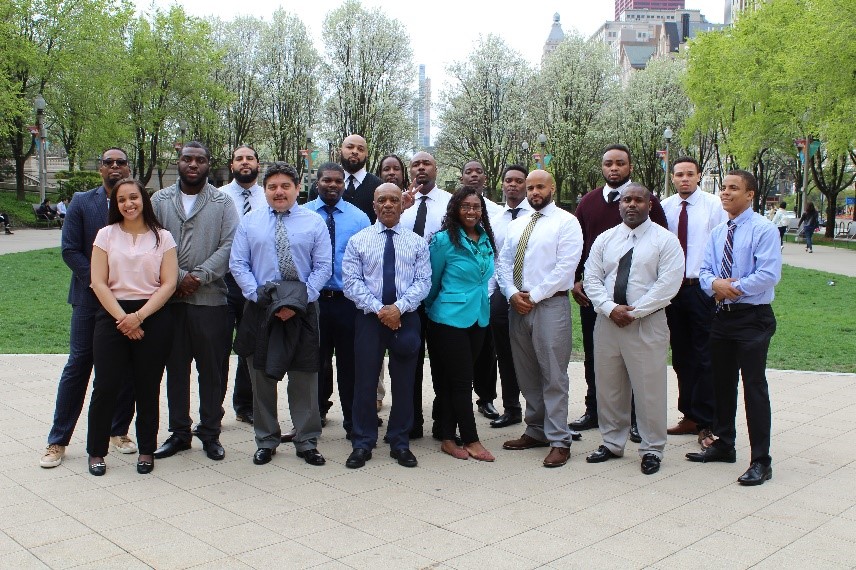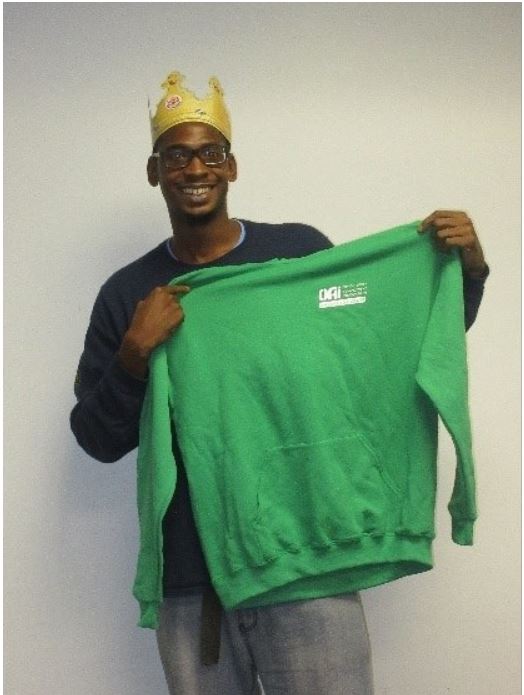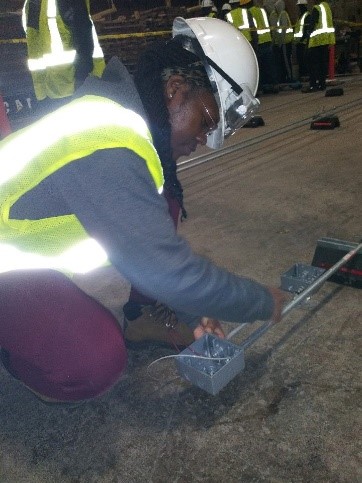OAI, Inc. – Opportunity Advancement Innovation in Workforce Development
The mission of Opportunity, Advancement, Innovation in Workforce Development (OAI, Inc.) is to provide training that leads to safe, meaningful employment while helping individuals and communities to thrive. The goal of the ECWTP at OAI is to increase sustainable employment opportunities, promote economic development, and advance environmental justice for disadvantaged communities overburdened by economic distress and health disparities. OAI Principal Investigator Salvatore Cali, ECWTP Director Montgomery Proffit, ECWTP Program Managers Kentina Kellum and Paula Grady, and other dedicated staff members work closely with consortium partners to provide insight and innovation for the betterment of the program. Their coordinated efforts ensure that training reaches disadvantaged communities facing barriers to employment.
Target Populations: The OAI ECWTP Consortium serves underrepresented, unemployed or underemployed, African American, Hispanic, female, individuals with prior justice system involvement, and military veterans in Chicago, Illinois; Dallas, Texas; Kansas City, Missouri and Kansas.
Training Strategy: OAI’s anchor ECWTP located in Chicago relies on a blended learning approach, where courses are delivered through a combination of instructor-led, online, and technology-enhanced training methods. Consortium partners may utilize lessons learned from this approach for the programs in Dallas and Kansas City.
Impact: OAI’s ECWTP was established in 1995 by Tipawan Reed, retired principal investigator, and has trained more than 2,500 individuals. In 2019 alone, OAI trained 85 trainees, and 80% of these trainees were placed in jobs.

OAI seeks to change the lives of unemployed and underemployed individuals by offering them opportunities for personal development and sustainable careers. “With every person we connect with, our goal is always to prove that when they leave our program, they are in a much better position than they were initially,” said Kellum.
Financial empowerment is a key component of the consortium, where all trainees receive financial coaching services to improve their financial health and better prepare them for life after graduation.
The OAI ECWTP consortium consists of training providers and partners in three cities. The anchor program at OAI Chicago administers and manages the grant. The Dallas ECWTP, also known as the Work Paths Program, is managed by CitySquare, a nonprofit organization that offers an array of social services to address issues of poverty. The Kansas ECWTP, also known as Built for Success, is managed by NuStart Career Builders.

The Chicago program makes a broad effort to ensure recruitment and retention of trainees who can successfully complete the program. Other consortium members are encouraged to use some or all of these steps. Prior to enrollment, trainees go through one-on-one interviews and tryout sessions. The tryouts usually involve a series of exercises spread out over two days to evaluate prospective trainee performance of job-related duties, physical fitness, leadership, team-building, problem solving and other skills. These sessions give prospective trainees an idea of the types of work they will be trained for; it also gives them an opportunity to decide if they would like to continue in the formal training. OAI staff use information gathered from these tryouts to select candidates that exhibit the greatest potential for success.
OAI utilizes a unique approach to trainings. In 2015, the Chicago program initiated a blended training approach that provides a mix of hands-on skills instruction, classroom teaching, and online instruction and engagement through a learning management system (LMS).
Engagement is a key component to reaching the student partners. For example, in order to further strengthen student learning and retention, the Chicago ECWTP implemented a peer learning concept. Students are divided into groups of two for each training cycle and encouraged to evaluate one another’s learning by working on classroom, homework, and online assignments together.
The consequences of such innovations in the use of the LMS component have exceeded expectations; personnel immediately noticed marked differences in student engagement and content retention. “The students look forward to the online content and gamification, where they compete with each other via learning content,” said Sean Phillips, OAI’s innovation and learning manager. “We have found that this increases just about everything across the board for students. It increases their test scores and their ability to retain information, which is crucial for our target population.”
The investment in an online training platform has served as a great benefit for OAI students, especially amid the COVID-19 pandemic. With lockdowns and social distancing restrictions in place, OAI had to switch from a blended approach to 100% online training. Phillips said that because they already had the LMS in place, along with instructors experienced in delivering online content, they were able to continue delivering ECWTP courses.
“The learning management system has been a blessing during this time,” said Kellum. “I am sure that has contributed to us not losing any students, because all of our students were already familiar and very comfortable with online learning.”
In 2016, Illinois passed the Future Energy Jobs Act (FEJA), which calls for updates to the states’ energy efficiency standards, seeking to stimulate job creation and strengthen the state’s future in renewable, clean energy.

The act has caused the solar panel industry to boom in Chicago. “It is projected over the next 25 years that solar will be on an upswing for Illinois,” Kellum said. “And we are front and center.” OAI received grant funding from ComEd through the FEJA to offer solar panel installation training for Chicago ECWTP trainees. As part of this training, Chicago ECWTP is delivering hands-on, entry-level training to individuals to become industry certified solar panel installers. This certification also offers a pathway to other jobs that are relevant in the solar industry, such as administrative, sales, and corporate positions. Kellum said at least 50% of the Chicago ECWTP trainees are working in the solar industry. The work tends to be through private companies, although OAI also strives to get students into the International Brotherhood of Electrical Workers.
Over the years, OAI has enhanced partnerships in Dallas and Kansas City by engaging with nonprofit organizations and employers. These partnerships provide a basis for reaching underserved populations, delivering training, and providing opportunities for life-changing careers.
For the Dallas ECWTP, the CitySquare Opportunity Center functions as the organization’s workforce training and development hub. CitySquare’s relationships with local employers like, JMEG, Hilti, and Austin Bridge and Road, allows customization of training to cater to employer needs. For example, in the 2018 through 2019 training year, CitySquare delivered training specific to welding and electrical services based on guidance from employers. Students were divided into two groups based on their career path of choice and received training specific to these areas, along with foundational training in HAZWOPER, construction, and other topics.
Although the partnership with NuStart Career Builders as part of the Kansas ECWTP is new, it has already helped build community relationships, establish new partnerships, and expand the employer base. NuStart Career Builders is an employment agency that offers training and certification in various areas, such as forklift operator, asbestos supervisor, mold remediation and others.
One group that NuStart Career Builders is helping reach is formerly incarcerated individuals. Ex-offenders often experience difficulties finding employment opportunities because of discrimination, institutional barriers, and lack of necessary skills. Training and career development initiatives are needed to ensure that ex-offenders are provided with opportunities to change their lives for the better. One example of this is NuStart Career Builders’ interest in linking trainees with an expungement initiative. The initiative would help trainees clear their criminal record, making them eligible for positions with union contractors who otherwise would not hire felons.
While quantifiable metrics such as program completion and employment are important, OAI also makes a concerted effort to evaluate the social and economic impacts of training. OAI uses a social ecological model and an economic assessment to measure these impacts.
The social ecological model is a five-level model that helps identify the influence that training has on participants across five levels: intrapersonal (individual), interpersonal, organizational, community, and societal (public policy). An unbiased, third-party evaluation is used to help determine if training resulted in a transfer of safety and health information across these levels.
“The social ecological model is used to make sure that trainees take what they have learned into the community,” said Proffit. “The heart of the program itself is not so much about individuals becoming qualified for gainful employment, but to become a leader in their community.”
Proffit shared an example: A Chicago ECWTP graduate called the local alderman, or local council member to report that trucks carrying hazardous chemicals were parking in a rest area close to a park within his community. Based on the ECWTP training he had received, the graduate realized that some of these chemicals posed health risks to people living near or visiting the park. The alderman later presented the issue before city council, which resulted in an ordinance within the city of Chicago where a truck carrying certain amounts of hazardous contaminants cannot be parked within a certain distance of a city park.
C. Myers, Chicago ECWTP
Prior to the training, C. Myers reported her insecurity about returning to the classroom as an adult and balancing the demands of attending training while caring for her three children as a single mother. Despite her doubts, Myers ended up earning the overall highest test scores in her training class. She expressed gratitude for her peers and the OAI staff for pushing and believing in her even when she found it difficult to believe in herself.
Myers is an example that perseverance and hard work will always pay dividends. She gained a newfound sense of confidence and drive during the program and obtained employment in the solar industry prior to graduation. She began her new career with Re- Think Solar and within 12 weeks, her wages increased from minimum wage to $18 per hour. Myers is one of a few women working in the solar industry and can be found proudly wearing her pink hard hat on solar worksites. Myers lives in Illinois Congressional District 7.
to Top


